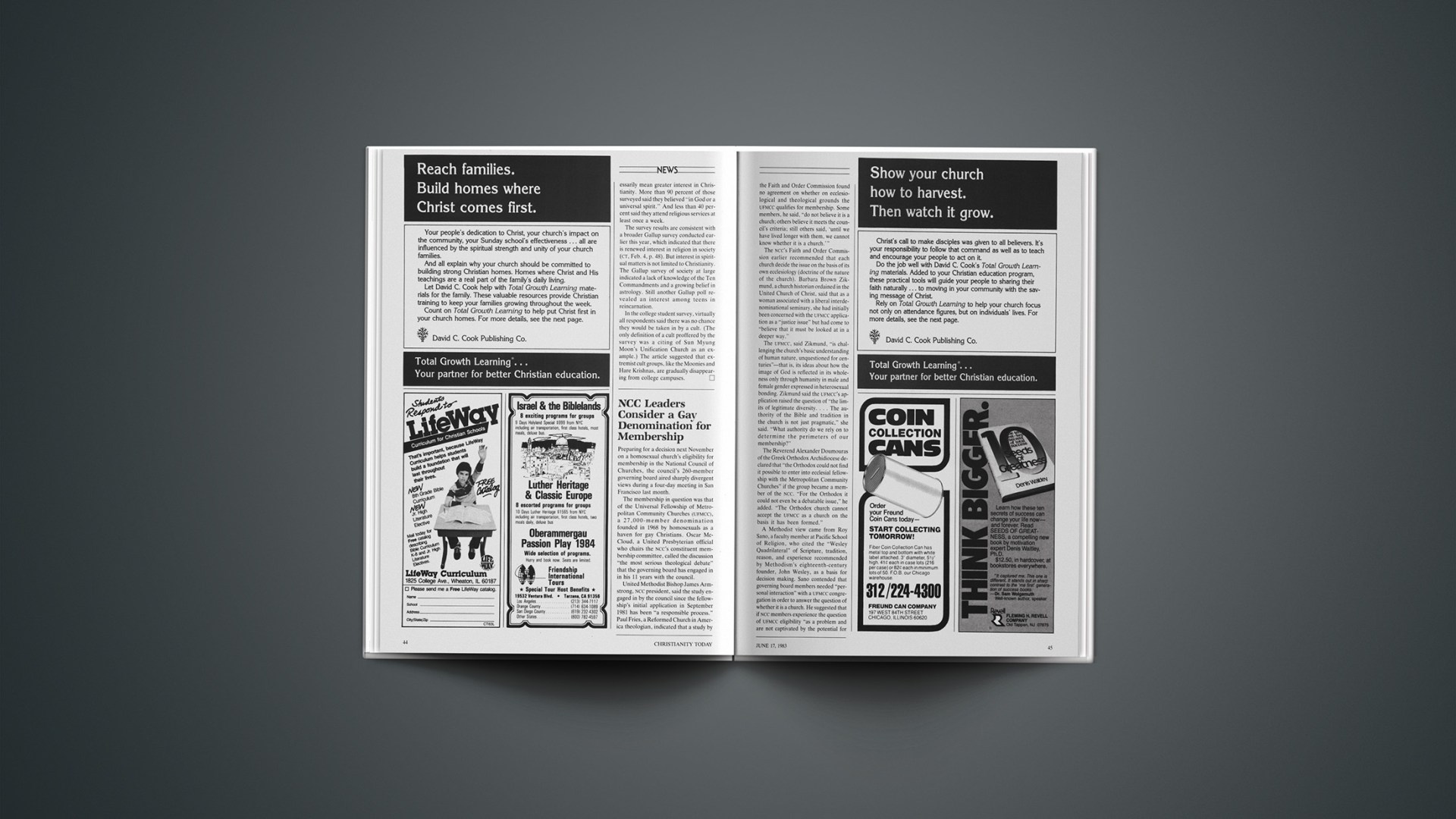Preparing for a decision next November on a homosexual church’s eligibility for membership in the National Council of Churches, the council’s 260-member governing board aired sharply divergent views during a four-day meeting in San Francisco last month.
The membership in question was that of the Universal Fellowship of Metropolitan Community Churches (UFMCC), a 27,000-member denomination founded in 1968 by homosexuals as a haven for gay Christians. Oscar McCloud, a United Presbyterian official who chairs the NCC’S constituent membership committee, called the discussion “the most serious theological debate” that the governing board has engaged in in his 11 years with the council.
United Methodist Bishop James Armstrong, NCC president, said the study engaged in by the council since the fellowship’s initial application in September 1981 has been “a responsible process.” Paul Fries, a Reformed Church in America theologian, indicated that a study by the Faith and Order Commission found no agreement on whether on ecclesiological and theological grounds the UFMCC qualifies for membership. Some members, he said, “do not believe it is a church; others believe it meets the council’s criteria; still others said, ‘until we have lived longer with them, we cannot know whether it is a church.’ ”
The NCC’S Faith and Order Commission earlier recommended that each church decide the issue on the basis of its own ecclesiology (doctrine of the nature of the church). Barbara Brown Zikmund, a church historian ordained in the United Church of Christ, said that as a woman associated with a liberal interdenominational seminary, she had initially been concerned with the UFMCC application as a “justice issue” but had come to “believe that it must be looked at in a deeper way.”
The UFMCC, said Zikmund, “is challenging the church’s basic understanding of human nature, unquestioned for centuries”—that is, its ideas about how the image of God is reflected in its wholeness only through humanity in male and female gender expressed in heterosexual bonding. Zikmund said the UFMCC’s application raised the question of “the limits of legitimate diversity.… The authority of the Bible and tradition in the church is not just pragmatic,” she said. “What authority do we rely on to determine the perimeters of our membership?”
The Reverend Alexander Doumouras of the Greek Orthodox Archidiocese declared that “the Orthodox could not find it possible to enter into ecclesial fellowship with the Metropolitan Community Churches” if the group became a member of the NCC. “For the Orthodox it could not even be a debatable issue,” he added. “The Orthodox church cannot accept the UFMCC as a church on the basis it has been formed.”
A Methodist view came from Roy Sano, a faculty member at Pacific School of Religion, who cited the “Wesley Quadrilateral” of Scripture, tradition, reason, and experience recommended by Methodism’s eighteenth-century founder, John Wesley, as a basis for decision making. Sano contended that governing board members needed “personal interaction” with a UFMCC congregation in order to answer the question of whether it is a church. He suggested that if NCC members experience the question of UFMCC eligibility “as a problem and are not captivated by the potential for deepening unity, I respectfully raise questions about the state of your souls.”
But a black Methodist—the Reverend Cecil Murray, pastor of an African Methodist Episcopal church in Los Angeles—had an opposing view. Declaring that he represented a consensus of his church, the oldest black denomination in North America, Murray said, “Our church is not against homosexual persons, but is against homosexual practices.” He said he has been asked whether, as a member of an oppressed minority, he should not stand in solidarity with homosexuals. “We do not think the experience of homosexuality can be effectively compared with that of being black.” Further, he said, “We view homosexuality as another force militating against black families. Any attack on the black family is an attack on the very survival of our posterity.… To embrace a philosophy of homosexuality would simply be a luxury we could not afford.”
“Is the UFMCC a biblically valid church body?” asked the Reverend Mark Heim of the American Baptist Churches. He said that is the question as far as American Baptists are concerned. “The vast majority of American Baptists believe that the practice of homosexuality is against Scripture.” Although the congregational ecclesiology of the American Baptist Churches precludes arriving at a consensus on the question, he said that the “main body of opinion” would find the UFMCC basing its existence on “a biblically invalid position.”
The next action on the application of the gay church is expected in November, when NCC board members will vote on whether the UFMCC is eligible for membership. If the board determines it is eligible, NCC member churches will vote on the application next year.










